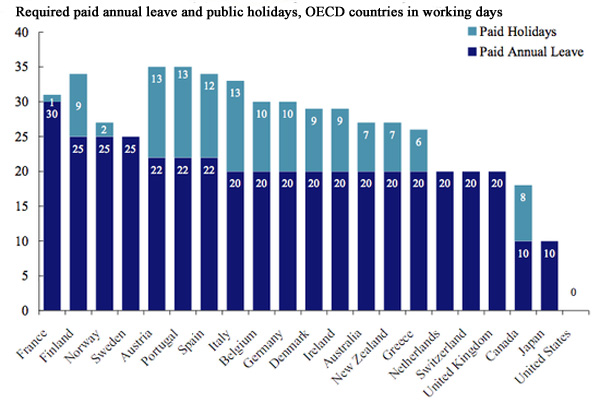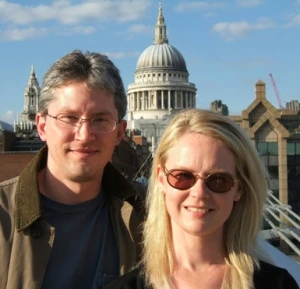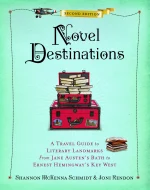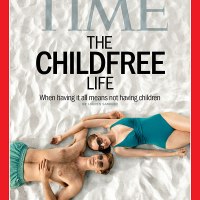Fantasizing a world without work is one of our specialties at EverywhereOnce. So when we saw an opinion piece of the same name authored by conservative Times columnist Ross Douthat, it got our attention. Given his predispositions, it’s not surprising that he disapproves of the concept. Given ours, it’s not surprising that we find fault with his reasoning.
He sets out on the wrong track almost immediately by framing his article as a retort to 19th-century utopian leftists, even throwing in a quote from Karl Marx for dramatic affect. But the ideas he takes issue with didn’t start there. Seventy two years before Marx and Engels wrote their Communist Manifesto, Adam Smith described how mechanization diminished the need for human labor.
If, through the use of better tools, a substance farmer doubles his yield, he then only needs to work half as hard to survive. This isn’t some wild notion concocted by Karl Marx, but a simple function of economic productivity. The futurists who imagined a world without work simply foresaw a time when productivity had grown to such a level that all our material needs were met with minimal human effort. It’s a natural enough extrapolation.
Only a strange thing happened on the way to Nirvana. As our capacity to build things grew, our desire to own things grew larger still. The farmer, discontent with merely having enough to eat, used his new tools to produce twice as much food as he needed and then traded the surplus for a larger barn and better clothes. Even after reaching the point of maximum comfort, he still longed for a new category of “designer” item whose only attribute was a price high enough to render it unaffordable to others. Naturally he redoubled his labors so he might acquire that too.
There are, of course, other options. Equipped with his new tools our farmer could have chosen to work half as hard and produce only what he needed. He could use his resulting bounty of spare time to pursue other passions. Instead of being a slave to the field, he’d now have room in his life for art and education, for family and friends, and yes, for community and charity, too.
What’s true for the individual is also true for the nation as a whole. Americans could have made other choices over the decades. Other nations certainly have, to varying degrees. We could have chosen to trade our productivity gains for more free time, but we opted for more income and more of everything else too. We did it so relentlessly that it became commonplace to view our self-worth and our occupation as one and the same.
Some folks have begun to push back against this status quo and that apparently has Ross miffed. He basically sees a voluntary decline in workforce participation as identical to a rise in welfare dependency. Before making that leap, though, a more basic question begs to be answered. And that is whether we, as individuals and as a nation, have made wise choices regarding the tradeoff between work and leisure? Whether reallocating the balance may be both beneficial and desirable? Not to mention whether some of the things he cares about, like community and faith, might be better served if we shifted a little of our time and emphasis away from the office?
Although he never addresses this question, implicit throughout his argument is the notion that perhaps we’re not working enough. Certainly one interpretation of his closing is that human flourishing and fulfillment spring from paid employment:
In a sense, the old utopians were prescient: we’ve gained a world where steady work is less necessary to human survival than ever before.
But human flourishing is another matter. And it’s our fulfillment, rather than the satisfaction of our appetites, that’s threatened by the slow decline of work.”
This, to me, gets things exactly backwards. In my experience work allowed for the expansion of appetites but did so by crowding out every other activity. It left no room for personal flourishing or fulfillment. For that, I had to curb my appetites and leave the regular job behind.






















Perhaps they’d like some work in Europe. They just can’t find it.
http://qz.com/58243/euro-zone-unemployment-hits-a-record-high-of-11-9/
“Unemployment in the euro zone hit a record 11.9% in January in seasonally adjusted numbers released by the European Commission today. That’s nearly 19 million people out of work, and more evidence that life isn’t getting any easier in the 17-member currency bloc. Unemployment for the 17-member euro currency bloc was 10.8% a year ago. By comparison, unemployment was 4.2% in Japan and 7.9% in the US for January.”
LikeLike
If you’re implying that a high unemployment rate in some Euro area countries is due to their vacation and sick day requirements, you’ll have to explain why places like Australia can require an OCED topping 35 days of leave and also achieve an unemployment rate of 5.4%, or Germany (30 days & 5.4% unemployment), or Norway (28 days & 3% unemployment), or Austria (35 days & 4.5% unemployment), or Switzerland (20 days & 3.3% unemployment), etc.
LikeLike
Excellent post; we’ve been having this conversation in our household. My husband and I are self-employed and we’re at a point now where we either make a big push to the next level of business-ownership, or we instead slowly begin to ease up and simplify over the next few years. We’re surprised to find we’re both leaning toward the latter: less income, but also fewer headaches — and we’ll regain all kindsa free time (our vacations currently consist of 4-day weekends twice a year). Business ownership was/is the right move for us, but I can’t say our quality of life is so greatly changed because of it.
That graph is chilling, by the way.
LikeLike
Finding the right balance is hard. Good luck in whatever you decide to do.
LikeLike
Great post…you may find the following interesting: http://digger666.com/2013/03/01/cancel-the-apocalypse-by-andrew-simms-review/
LikeLike
I completely agreee with you. My husband has hit a point with his job where instead of negotiating raises he negotiates more time off. In our opinion, a better quality of life involves more time hiking in the mountains or walking on a beach, not a McMansion (and there are 7 in our family!) with Italian tile and granite countertops.
LikeLike
We’ll drink to that. 😉
LikeLike
Can’t agree with you more! Very thought provoking post. Though I have friends who seem to be lost without their jobs, it doesn’t seem like much of a life to me.
LikeLike
It’s true that some people define themselves by what they do. I don’t really get it, but then I don’t want to judge them either if they’re happy doing what they’re doing. Too often, though, it seems to me that people aren’t really happy but don’t even know that alternatives exist.
LikeLike
I totally agree with you. Life is too short to work it away without enjoyment. I’ve worked at a few places where I felt like I was little more than an indentured servant. Happily, I’ve found a good situation now, and I never want to return to working for mega-corporations that treat people like machines.
We fought hard in this country for the few paid leave times we have, and it seems now that paid leave is constantly under threat – worse with every recession. I’m not sure we made these choices so much as that we didn’t fight hard enough to protect our leisure time. I see people on vacation all the time with cell phones glued to their ears and laptops even on the beach. I know a few of these people are cyber-addicts, but a lot of them feel their jobs are at risk if they can’t answer every e-mail even on vacation. That seems like a voluntary submission to the Borg, to me. I resist work cutting into free time.
LikeLike
“Resistance is futile.” LOL
LikeLike
Isn’t it true too though that Americans as a group also give more to charity per capita than in any other nation (just as they also have the highest labor productivity)? This would likely be the result of that farmer using that doubling in productivity to produce more and give out the extra fruits of his labor rather than using it to increase leisure time and possibly devote some time to community.
Leisure time indeed is something worth fighting for and treasuring but it does come as a result of society’s increased productivity and output increasing our access to the luxuries of leisure. Things like the poorest in China and India having access to Internet because of low cost smartphones never would have happened if that farmer hadn’t decided he’d like to increase how much money he wanted to make.
LikeLike
Good thoughts, Bucko.
It’s true that we Americans are a charitable bunch. I think it is probably also true that being richer allows us to be a bit more generous. But it’s hard to draw definitive conclusions. For example, a good slug of our private giving goes toward things that the state provides in other places – like food pantries, etc. So I’m not sure it’s at all clear whether we are more generous because we are richer or because our need is greater.
And you’re right that further increases in productivity require someone to invent them. If no one does that, then progress stops. Future generations would obviously be worse off than they otherwise would be. Of course I’m left to wonder whether anyone would miss a smartphone that was never invented.
LikeLike
While I’d agree that it’s hard to miss something that was never there, at the same time you can’t ignore the additional benefits that increases in technology have brought. Even with a smartphone for example, the technology has allowed for a form of grassroots democracy in a one party, authoritarian state like china because of things like domestic social media. Overall it seems to me as if the benefits of a profit seeking centric culture over the past 100 years far out weigh the cons.
And with regards to the charity, regardless of why its being provided, the point is that despite being profit driven we still offer up a large amount of our excess to help others (excesses that wouldn’t exist without profit and which would be necessary whether provided by the state or private pockets).
Either way, I think the point is still well taken, while it is easy to get caught up in a world driven by profits and professional advancement, it’s important not for lose sight about things like personal advancement and the enjoyment of life!
LikeLike
Yup. Nothing written here suggests a free lunch. In fact, the entire article is about choices and tradeoffs. And it’s not even remotely about the profit motive. It’s about deciding when enough is enough and whether there is more to life than just more.
LikeLike
Great thinking, Brian. I have, for some time, been thinking about the fact that we are driven by profits. The esteemed norm for business owners is no longer to make a good living and to provide steady employment for others. What is aspired to is more and more profits – and this is fueled by going public. Of course I am tacitly supporting this by having my nice portfolio that is supporting my retirement. I want to hate what Wall Street is doing to capitalism and our balance of work and pleasure but…
You are right on about how we have moved to equating our all consuming careers with identity – at least for the middle class. I had a terrible time moving from my work identity to being retired. I lost my sense of who I am. Didn’t happen to many of my friends but it did to me.
LikeLike
Thought provoking post. I think Brian is 100% right when he says finding the right balance is hard. For me the secret is top start scaling down bit by bit and making do with less possessions and having more experiences. Like Deb says, forgo the McMansion with all the bells and whistles and focus on experiencing the world around you.
LikeLike
For me, the trick is first deciding what you want out of life. That, I think, is the really hard part. Once you know that objective, it’s a bit easier to see what’s preventing you from reaching your goals – whether that is excessive stuff that saps your resources, an unfulfilling career that consumes too much of your time, or something else entirely.
LikeLike
Interesting article. Life really is all about balance….
LikeLike
Work less, get more time to do the things you love, but get paid less. That is a good system and one that I adhere to. Problem is some people want to work less and get paid more. It’s a problem in Australia since we have such an affluent middle class who want everything and have never seen hard times and have never had to show restraint. They believe they are entitled to everything. Then we have an economy in decline as we become uncompetitive in international markets. That might be what Ross Douthat was alluding to although I haven’t read that article. Be productive, get paid based on your productivity, and work as much or as little as you want. That is how I reckon it should operate.
LikeLike